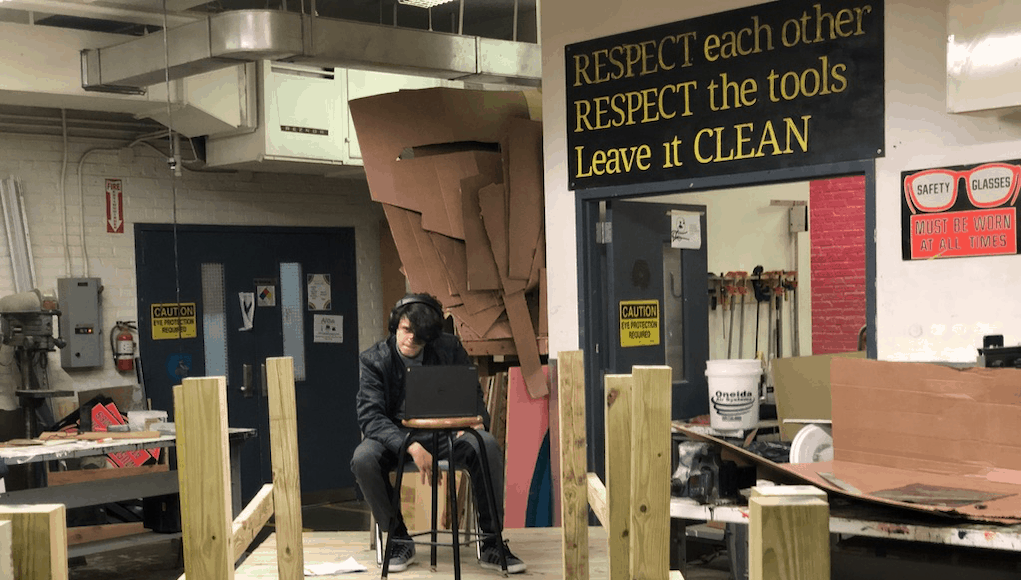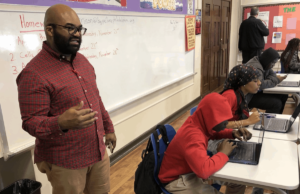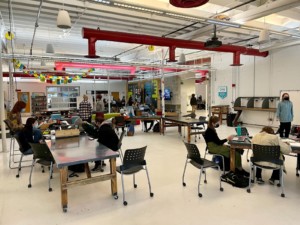The Progressive Schools of Philadelphia

From academic intensive care to world-class exemplars of inquiry-based learning, the 10 progressive autonomous schools in the Philadelphia Innovation Network work together to expand opportunity. Part of the School District of Philadelphia (@PHLschools), the network includes a variety of productive local and national partnerships that serve children and families.
Vaux Big Picture
David Bromley has worked in some of America’s most under-resourced communities, but about Philadelphia’s Sharswood neighborhood he said, “This is a whole different level of need.”
About 80 percent of students live in public housing. Many have suffered heavy trauma.
Gentrification is evident just blocks away from the urban island of unemployment, poverty, and crime. Social services are almost nonexistent. The two schools serving the neighborhood closed long ago.
Bromley is the executive director of Big Picture Philadelphia. The nonprofit operates two new schools under contract to the school district (the only contract schools in the Big Picture Learning or BPL, network).
At home in a giant art deco depression era school building, Vaux Big Picture High School is a partnership between the school district, the housing authority, the teacher’s union, and Big Picture.
Schools in the BPL network use student internships to engage young people in areas of interest and to build work-ready skills.
In its second year, the school serves freshman and sophomores. The assessed math and reading levels of incoming students are less than fourth grade. At full enrollment, Vaux will serve 540 students.
“We meet them where they are cognitively,” said Bromley. He argues that drill and practice would only cause students to drop out. “We created a place kids want to be. We created ownerships through internships,” added Bromley.
As part of the Innovation Network, “We have a lot of latitude and independence in how we implement our model of learning,” said Vaux principal Gabe Kuriloff. “One of the biggest things is the freedom to create our own schedule. As a Big Picture school, the daily schedule is full of internships and would not work if we were required to have a traditional schedule,” added Kuriloff.
The first floor of the giant complex includes the housing authority and nonprofit partners that provide youth and family services. The Community College of Philadelphia provides dual enrollment opportunities for students.
“Our strengths in year two are that kids happy to be here, relationships strong, and we have a high attendance rate of about 92%,” said Bromley.
Compared to other Big Picture schools, Vaux retains more of a traditional school structure with classes where teachers focus on accelerating skill development. Teachers are experimenting with dual tracks where some students have the option to do more project-based learning.
Ninth graders take a Real World Learning class to gain work-ready competencies and they start internships in tenth grade.
Students present public products at exhibitions at the end of each semester. About 95% of the students had parents in attendance at the last exhibition.

The Workshop School
On why he’s at the Workshop School, Anibal said, “I do my own research. My parents didn’t go to school. I’ve been making my own decisions since I was seven.” He left half his family in Mexico to attend school in Philadelphia. He’s confident that at Workshop he’s on the right track.
In the former annex of West Philadelphia High (built in 1911 and now being converted to condominiums) is the six-year-old Workshop School.
Students spend a four-hour morning block in advisory. It starts with 30 minutes of circle time then moves into project time. Afternoon skill-building seminars often include culminating projects.
 Founder Simon Hauger (above) said the big block builds community. ‘Students are known, stretched, and cared for in the community.”
Founder Simon Hauger (above) said the big block builds community. ‘Students are known, stretched, and cared for in the community.”
Aiming at MyWays outcomes, most of the integrated projects are designed by teachers with a mix of standards embedded. Exhibitions are held at the end of the term.
With no seat time requirements, the progressive schools of Philadelphia are free to pursue competency-based approaches. The Workshop School is petitioning for competency-based graduation requirements based on MyWays outcomes.
In 11th grade, students do internships for a day and a half each week.
John, a senior (below), went to “a bad middle school.” He got good grades but found himself unprepared for rigorous high school work. Given the support he received and the sense of community he experienced at Workshop, he said he’ll be sad to leave.

U School
In North Philadelphia, just east of Temple University is The U School. Winner of a Carnegie Opportunity by Design grant, U School is working on four areas of focus:
- Youth development: students participate in advisory groups (called a Posse) to support goal-setting, college and career planning, and family engagement.
- Personalized learning: learners are supported in the development of a personalized learning plan that incorporates learner interests, needs, and aspirations.
- Design-based: learners lead personal and team-based investigations around great challenges and develop key skills in research, problem-solving, communications, and taking action.
- Competency-based: learners advance as they demonstrate proficiency in the learning goals.

Principal Neil Geyette (above) said they are working on three interfaced teacher-led classes, semi-autonomous learning and fully autonomous learning (where students work independently). Students build their schedule with an advisor.
At The U School, the motto is “We Love. We Dream. We Do.” Students are given real-world challenges and asked to apply knowledge. Seniors write 15 college level pieces. They must complete 100% of required portfolio items.

More Innovative Schools
Nonprofit Building 21 operates a North Philadelphia high school focused on MyWays-inspired outcomes (above) with personalized pathways designed to meet the strengths and interests of every learner.
Building 21 is developing a network of member schools around the outcomes framework, project-based learning model, competency-based assessments, and systems to manage teaching and learning.
LINC High School is a member of the project-based New Tech Network. Team-taught integrated projects supported by the Echo platform prepares young people for the world that awaits them.
The most academically mature school in the Innovation Network is Science Leadership Academy, launched in 2006 by Chris Lehmann. Learning at SLA reflects five shared values of inquiry, research, collaboration, presentation, and reflection. SLA (featured here) operates two other schools in the network, SLA Middle School and SLA at Beeber.
For more see:
- Students Ask Big Questions At Science Leadership Academy
- Building 21: Designing a Network for Competency-Based Education
- New Tech Network Powers A Common Learning Model & Unique Missions
This post was originally published on Tom’s EdWeek Channel.
Stay in-the-know with all things edtech and innovations in learning by signing up to receive the weekly Smart Update. This post includes mentions of a Getting Smart partner. For a full list of partners, affiliate organizations and all other disclosures, please see our Partner page.






CK
Yup, You already know U School.